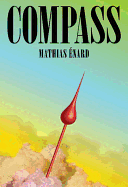
Musicologist and opium smoker Franz Ritter has insomnia, due in part to worry over an illness for which his doctor has sent him to "a specialist in exotic infections." As Compass, Mathias Énard's Prix Goncourt-winning novel, begins, Franz listens to "the rhythm of the trams descending towards the Schottentor" from his Vienna apartment, and reads an article his friend Sarah, a scholar and his former lover, has written about an Iranian novelist who died impoverished in Paris. For the remainder of that long night--and the bulk of this dense and challenging novel--Franz recalls his and Sarah's travels throughout Iran and Syria. They grew fascinated with artists influenced by the East--Balzac and Proust, and composers like Félicien David, "the foremost Orientalist musician, forgotten like all those who have devoted themselves body and soul to the ties between East and West."
Compass is not so much a traditional narrative as a series of essays on politics, music and literature, and on the ways in which Western artists have incorporated the achievements of their Eastern counterparts into their works--artists for whom the compass pointed east. Énard's tone is erudite without being stuffy. And he has an endearing wit: Franz says that the specialist his doctor sent him to looks like the German poet Gottfried Benn, a resemblance that prompts an already worried Franz to state that "being auscultated by the author of Morgue and Flesh doesn't inspire a whole lot of confidence in you." --Michael Magras, freelance book reviewer

